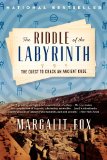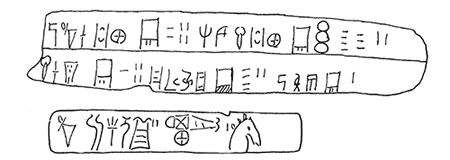Summary | Excerpt | Reviews | Beyond the Book | Readalikes | Genres & Themes | Author Bio

Critics' Opinion:
Readers' Opinion:
First Published:
May 2013, 384 pages
Paperback:
Apr 2014, 400 pages
 Book Reviewed by:
Book Reviewed by:
Poornima Apte
Buy This Book
But these treasures paled beside what Evans found on the excavation's eighth day. On March 30, a workman's spade dislodged the first clay tablet. On April 5, a whole cache of tablets, many in perfect condition, was found in a single room of the palace.
The tablets, when Evans unearthed them, were Europe's earliest written records. Inscribed with a stylus when the clay was still wet, they dated to about 1450 B.C., nearly seven centuries before the advent of the Greek alphabet. The characters they contained—outline drawings in the shape of human figures, swords, chariots, and horses' heads, among other tiny pictograms—resembled the symbols of no known alphabet, ancient or modern.

Linear B tablets from Knossos.
Evans named the ancient writing Linear Script Class B— Linear B, for short. (He also turned up evidence of a somewhat older Cretan script, likewise based on outline drawings, which he called Linear Script Class A.) By the end of his first season's dig, he had unearthed more than a thousand tablets written in Linear B.
Though Evans couldn't read the tablets, he immediately surmised what they were: administrative records, carefully set down by royal scribes, documenting the day-to-day workings of the Knossos palace and its holdings. If the tablets could be decoded, they would open a wide portal onto the daily life of a refined, wealthy, and literate society that had thrived in Greek lands a full millennium before the glory of Classical Athens. Once their written records could be read, the Knossos palace and its people, languishing for thirty centuries in the dusk of prehistory, would suddenly be illuminated—with a single stroke, an entire civilization would become history.
But which civilization was it? As Evans well knew, many ethnic groups had passed through the Bronze Age Aegean, and there was no way to tell whose language, and whose culture, Linear B represented. To him, though, this seemed a small impediment. Evans was already something of an authority on ancient scripts, and with characteristic assurance, he assumed he would one day decipher this one. By 1901, only a year after the first tablet was unearthed, he had commissioned Oxford University Press to cast a special font, in two different sizes, with which to typeset the Cretan characters.
But Evans underestimated the formidable challenge Linear B would pose. An unknown script used to write an unknown language is a locked-room mystery: Somehow, the decipherer must finesse his way into a tightly closed system that offers few external clues. If he is very lucky, he will have the help of a bilingual inscription like the Rosetta stone, which furnished the key to deciphering the hieroglyphs of ancient Egypt. Without such an inscription, his task is all but impossible.
As Evans could scarcely have imagined in 1900, Linear B would become one of the most tantalizing riddles of the first half of the twentieth century, a secret code that defied solution for more than fifty years. As the journalist David Kahn has written in The Codebreakers, his monumental study of secret writing, "Of all the decipherments of history, the most elegant, the most coolly rational, the most satisfying, and withal the most surprising" was that of Linear B.
The quest to decipher the tablets—or even to identify the language in which they were written—would become the consuming passion of investigators around the globe. Working largely independently in Britain, the United States, and on the European continent, each spent years trying to tease the ancient script apart. The best of them brought to the problem the same meticulous forensic approach that helps cryptanalysts crack the thorniest codes and ciphers.
From The Riddle of the Labyrinth by Margalit Fox © 2013 Margalit Fox. Reprinted courtesy of Ecco, an imprint of HarperCollins Publishers.





The Funeral Cryer by Wenyan Lu
Debut novelist Wenyan Lu brings us this witty yet profound story about one woman's midlife reawakening in contemporary rural China.
Your guide toexceptional books
BookBrowse seeks out and recommends the best in contemporary fiction and nonfiction—books that not only engage and entertain but also deepen our understanding of ourselves and the world around us.